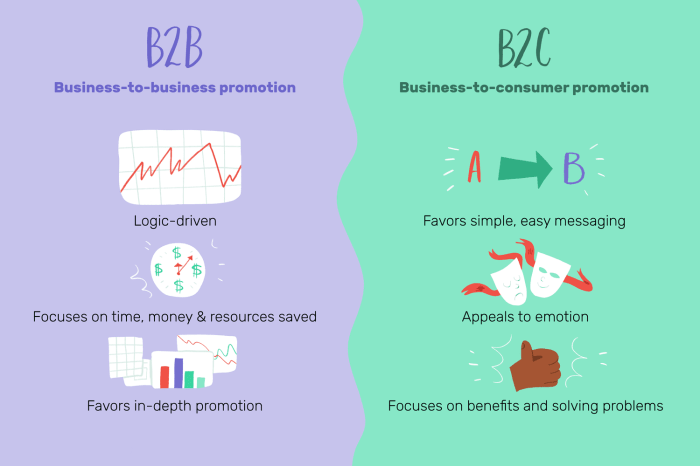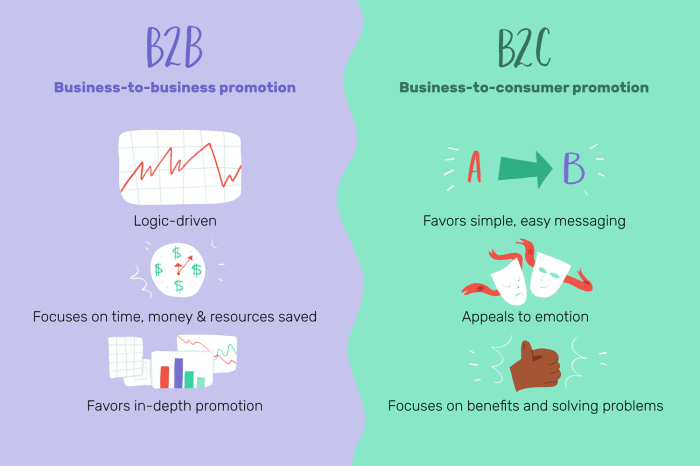Understanding B2B and B2C Sales sets the stage for this enthralling narrative, offering readers a glimpse into a story that is rich in detail with american high school hip style and brimming with originality from the outset.
Get ready to uncover the ins and outs of B2B and B2C sales, from the differences between them to the key strategies for success in each realm.
B2B vs. B2C Sales

In the world of sales, there are two main categories: Business-to-Business (B2B) and Business-to-Consumer (B2C) sales. These two types of sales involve different strategies, target audiences, and products/services.
Main Differences
When it comes to B2B sales, transactions are between businesses. This means that the products or services are sold from one company to another company. On the other hand, B2C sales involve transactions between a business and individual consumers. The main difference lies in the target audience and the nature of the transaction.
Examples of Products/Services
- In B2B sales, examples of products/services include software solutions for businesses, office equipment, raw materials, and consulting services.
- On the other hand, in B2C sales, products such as clothing, electronics, beauty products, and household items are typically sold directly to consumers.
Target Audience
- In B2B sales, the target audience consists of businesses, organizations, and institutions that require specific products or services to operate or improve their processes.
- Conversely, in B2C sales, the target audience is individual consumers who purchase goods or services for personal use or consumption.
Understanding B2B Sales

In the world of business-to-business (B2B) sales, the dynamics are quite different from business-to-consumer (B2C) sales. Let’s dive into the specifics of B2B sales and explore the typical sales cycle, the importance of relationship-building, and the role of trust and credibility.
Typical Sales Cycle in B2B Transactions, Understanding B2B and B2C Sales
In B2B transactions, the sales cycle is usually longer and more complex compared to B2C transactions. It involves multiple decision-makers, procurement processes, negotiations, and contract agreements. The typical sales cycle in B2B sales can range from several weeks to several months, depending on the industry and the complexity of the products or services being sold.
Importance of Relationship-Building in B2B Sales
Relationship-building is paramount in B2B sales. Establishing strong relationships with key decision-makers, influencers, and stakeholders within a company can lead to long-term partnerships and repeat business. Building rapport, trust, and credibility through regular communication, personalized interactions, and delivering on promises are crucial aspects of successful B2B sales.
Role of Trust and Credibility in B2B Sales
Trust and credibility play a significant role in B2B sales. Businesses are more likely to engage in transactions with suppliers or partners they trust and perceive as credible. Building trust involves demonstrating expertise, delivering high-quality products or services, meeting deadlines, and providing excellent customer support. Credibility is established through consistent performance, transparency, and reliability in all business dealings.
Understanding B2C Sales
In the world of business, B2C sales refer to transactions made between a business and individual consumers. This type of sales focuses on selling products or services directly to the end-user, rather than another business entity. Understanding B2C sales involves delving into the emotional aspect of consumer behavior, successful marketing strategies, and the crucial role of branding.
Emotional Aspect of B2C Sales
When it comes to B2C sales, emotions play a significant role in purchasing decisions. Consumers are often driven by their feelings, desires, and aspirations when making buying choices. Marketers tap into these emotions by creating compelling stories, appealing to specific needs or wants, and building a connection with the target audience. For example, a luxury brand may evoke feelings of exclusivity and status to attract high-end consumers.
Successful B2C Marketing Strategies
Successful B2C marketing strategies often involve a combination of digital marketing, social media engagement, influencer partnerships, and personalized experiences. Companies like Nike, Apple, and Coca-Cola have excelled in creating memorable campaigns that resonate with consumers on a personal level. By leveraging data analytics and consumer insights, businesses can tailor their marketing efforts to target specific demographics and maximize engagement.
Role of Branding in B2C Sales
Branding is essential in B2C sales as it helps differentiate a company’s products or services from competitors in the market. Strong branding creates recognition, loyalty, and trust among consumers, influencing their purchasing decisions. Brands like Amazon, Disney, and Starbucks have built a reputation for quality, reliability, and customer satisfaction, which drives customer loyalty and repeat business. A well-defined brand identity sets the tone for marketing campaigns, product positioning, and overall customer experience.
Strategies for B2B Sales Success
In the competitive world of B2B sales, it is crucial to have effective strategies in place to generate leads, provide personalized solutions, and leverage data analytics for optimal results.
Key Strategies for Generating Leads in B2B Sales
Generating leads is a vital aspect of B2B sales success. Here are some key strategies to consider:
- Utilize content marketing to attract potential leads through valuable and informative content.
- Implement targeted email campaigns to reach out to specific decision-makers within organizations.
- Attend industry events and conferences to network with potential leads and establish connections.
- Collaborate with complementary businesses to tap into their customer base and generate leads through referrals.
Importance of Personalized Solutions in B2B Sales
Personalized solutions play a significant role in B2B sales as they demonstrate a deep understanding of the client’s needs. This can lead to stronger relationships and increased sales. Some ways to provide personalized solutions include:
- Conducting thorough research on the client’s business to tailor your offerings to their specific requirements.
- Customizing your sales pitches and proposals to address the unique challenges faced by each client.
- Offering flexible pricing and payment options that align with the client’s budget and preferences.
Role of Data Analytics in Optimizing B2B Sales Processes
Data analytics is instrumental in optimizing B2B sales processes by providing valuable insights and enabling data-driven decision-making. Here’s how data analytics can enhance B2B sales:
- Identifying trends and patterns in customer behavior to anticipate their needs and preferences.
- Segmenting leads based on their likelihood to convert, allowing for targeted and personalized marketing efforts.
- Measuring the effectiveness of sales strategies and campaigns to make informed adjustments for better results.
Strategies for B2C Sales Success: Understanding B2B And B2C Sales
Creating a seamless customer experience in B2C sales is crucial for success. It involves providing personalized interactions, easy navigation on websites, and quick responses to customer inquiries.
Impact of Social Media on B2C Sales Strategies
Social media plays a significant role in B2C sales strategies by allowing businesses to reach a wider audience, engage with customers in real-time, and gather valuable feedback. Platforms like Instagram, Facebook, and Twitter can be used to showcase products, run targeted ads, and build brand loyalty.
Significance of Customer Reviews and Testimonials in B2C Sales
Customer reviews and testimonials are essential in B2C sales as they provide social proof and build trust with potential customers. Positive reviews can influence purchasing decisions, while negative feedback can help businesses identify areas for improvement. Encouraging satisfied customers to leave reviews and sharing testimonials on websites can enhance credibility and attract new customers.
